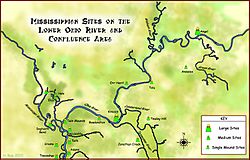Tolu Site facts for kids

Mississippian sites on the Lower Ohio River
|
|
| Location | Tolu, Crittenden County, Kentucky, United States |
|---|---|
| Region | Pennyroyal Plateau |
| Coordinates | 37°26′14″N 88°15′6″W / 37.43722°N 88.25167°W |
| History | |
| Founded | 1200 CE |
| Cultures | Mississippian culture |
| Site notes | |
| Archaeologists | W.S. Webb, William D. Funkhouser |
| Architecture | |
| Architectural styles | Platform mounds |
| Responsible body: private | |
The Tolu Site is an ancient place where people used to live a long time ago. It's in Crittenden County, Kentucky, near a small community called Tolu. This site was home to people of the Mississippian culture, a group of Native Americans who lived in the central and southeastern United States.
The Tolu Site was built and used between the years 1200 and 1450 CE. This means it was active about 800 years ago! Experts looked at the pottery found there. They think most people lived at the site between 1200 and 1300 CE.
Contents
What Was the Tolu Site Like?
When it was first built, the Tolu Site had three large mounds. Mounds are big piles of earth built by people. One mound was a burial mound, where people were buried. Another was a platform mound. These were flat-topped mounds where important buildings, like temples or chiefs' homes, might have stood. The purpose of the third mound is not fully known.
Who Explored the Tolu Site?
In 1930, two archaeologists, W.S. Webb and William D. Funkhouser, explored the Tolu Site. Archaeologists are like history detectives. They dig up and study old things to learn about how people lived in the past.
Connecting the Tolu Site to Other Ancient Places
The Tolu Site is part of a larger group of Mississippian sites. It's connected to something called the "Angel Phase." This means it shares similar features with other sites from the same time period.
The "Kincaid Set" of Sites
The Tolu Site is also part of a special group called the "Kincaid Set." This group includes other famous Mississippian sites like Angel Mounds in Indiana and Kincaid Mounds in Illinois. Wickliffe Mounds in western Kentucky is also part of this set. These sites are grouped together because they have similar styles of pottery and their communities were built in similar ways. This helps archaeologists understand how these ancient groups were connected.
A Special Discovery: The Fluorite Statue
In May 1954, a local farmer made an amazing discovery near Tolu. While plowing his field, he found a stone statue. This statue was carved from a grayish-white stone called fluorite.
Why Is This Statue Important?
This statue is considered one of the most detailed examples of Mississippian stone statuary ever found. It shows a special hairstyle called a "beaded forelock." This hairstyle was very common in other Mississippian artwork, especially on engraved mussel shells. The statue is a rare and beautiful piece of Native American art.
 | James Van Der Zee |
 | Alma Thomas |
 | Ellis Wilson |
 | Margaret Taylor-Burroughs |


